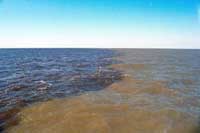D ead zones are areas where there is too little oxygen in the water to support fish and other aquatic life. They are usually caused by fertilizers and/or other organic materials causing algae blooms which deplete the oxygen in the water. Dead zones in the Gulf of Mexico from the run-off from fertilizers and chemicals flowing into the Mississippi have been forming yearly since the 1970s. Now there is serious concern about the impact this year’s flood in the Midwest may have on the waters of the Gulf.
ead zones are areas where there is too little oxygen in the water to support fish and other aquatic life. They are usually caused by fertilizers and/or other organic materials causing algae blooms which deplete the oxygen in the water. Dead zones in the Gulf of Mexico from the run-off from fertilizers and chemicals flowing into the Mississippi have been forming yearly since the 1970s. Now there is serious concern about the impact this year’s flood in the Midwest may have on the waters of the Gulf.
Chemicals in Farm Runoff Rattle States on the Mississippi
As the surging waters of the Mississippi pass downstream, they leave behind flooded towns and inundated lives and carry forward a brew of farm chemicals and waste that this year — given record flooding — is expected to result in the largest dead zone ever in the Gulf of Mexico.
Dead zones have been occurring in the gulf since the 1970s, and studies show that the main culprits are nitrogen and phosphorus from crop fertilizers and animal manure in river runoff. They settle in at the mouth of the gulf and fertilize algae, which prospers and eventually starves other living things of oxygen.
Government studies have traced a majority of those chemicals in the runoff to nine farming states, and yet today, decades after the dead zones began forming, there is still little political common ground on how to abate this perennial problem. Scientists who study dead zones predict that the affected area will increase significantly this year, breaking records for size and damage.
For years, environmentalists and advocates for a cleaner gulf have been calling for federal action in the form of regulation. Since 1998, the Environmental Protection Agency has been encouraging all states to place hard and fast numerical limits on the amount of those chemicals allowed in local waterways. Yet of the nine key farm states that feed the dead zone, only two, Illinois and Indiana, have acted, and only to cover lakes, not the rivers or streams that merge into the Mississippi.
